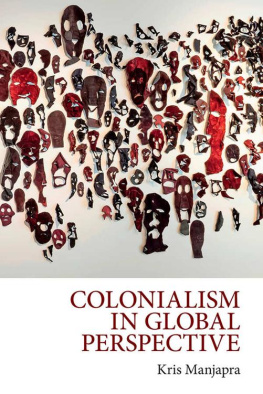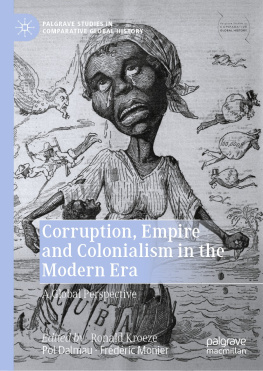Kris Manjapra - Colonialism in Global Perspective
Here you can read online Kris Manjapra - Colonialism in Global Perspective full text of the book (entire story) in english for free. Download pdf and epub, get meaning, cover and reviews about this ebook. year: 2020, publisher: Cambridge University Press, genre: Politics. Description of the work, (preface) as well as reviews are available. Best literature library LitArk.com created for fans of good reading and offers a wide selection of genres:
Romance novel
Science fiction
Adventure
Detective
Science
History
Home and family
Prose
Art
Politics
Computer
Non-fiction
Religion
Business
Children
Humor
Choose a favorite category and find really read worthwhile books. Enjoy immersion in the world of imagination, feel the emotions of the characters or learn something new for yourself, make an fascinating discovery.
- Book:Colonialism in Global Perspective
- Author:
- Publisher:Cambridge University Press
- Genre:
- Year:2020
- Rating:4 / 5
- Favourites:Add to favourites
- Your mark:
- 80
- 1
- 2
- 3
- 4
- 5
Colonialism in Global Perspective: summary, description and annotation
We offer to read an annotation, description, summary or preface (depends on what the author of the book "Colonialism in Global Perspective" wrote himself). If you haven't found the necessary information about the book — write in the comments, we will try to find it.
Colonialism in Global Perspective — read online for free the complete book (whole text) full work
Below is the text of the book, divided by pages. System saving the place of the last page read, allows you to conveniently read the book "Colonialism in Global Perspective" online for free, without having to search again every time where you left off. Put a bookmark, and you can go to the page where you finished reading at any time.
Font size:
Interval:
Bookmark:
Colonialism in Global Perspective
Kris Manjapra weaves together the study of colonialism over the past 500 years across the globe's continents and seas. This captivating work vividly evokes living human histories, introducing the reader to manifestations of colonialism as expressed through war, militarization, extractive economies, migrations and diasporas, racialization, biopolitical management, and unruly and creative responses and resistances by colonized peoples. This book describes some of the most salient political, social, and cultural constellations of our present times across the Americas, Africa, Asia, and Europe. By exploring the dissimilar, yet entwined, histories of conquest, settler colonialism, racial slavery, and empire, Manjapra exposes the enduring role of colonial force and freedom struggle in the making of our modern world.
Kris Manjapra is Associate Professor of History and founding Chair of the Department of Studies in Race, Colonialism, and Diaspora at Tufts University. He is the author of M. N. Roy: Marxism and Colonial Cosmopolitanism (2009), Cosmopolitan Thought Zones of South Asia (co-editor, 2010), and Age of Entanglement: German and Indian Intellectuals across Empire (2014).
Colonialism in Global Perspective
Kris Manjapra


University Printing House, Cambridge CB2 8BS, United Kingdom
One Liberty Plaza, 20th Floor, New York, NY 10006, USA
477 Williamstown Road, Port Melbourne, VIC 3207, Australia
314321, 3rd Floor, Plot 3, Splendor Forum, Jasola District Centre, New Delhi 110025, India
79 Anson Road, #0604/06, Singapore 079906
Cambridge University Press is part of the University of Cambridge.
It furthers the Universitys mission by disseminating knowledge in the pursuit of education, learning, and research at the highest international levels of excellence.
www.cambridge.org
Information on this title: www.cambridge.org/9781108425261
DOI: 10.1017/9781108560580
Kris Manjapra 2020
This publication is in copyright. Subject to statutory exception and to the provisions of relevant collective licensing agreements, no reproduction of any part may take place without the written permission of Cambridge University Press.
First published 2020
Printed in the United Kingdom by TJ International Ltd, Padstow Cornwall
A catalogue record for this publication is available from the British Library.
ISBN 978-1-108-42526-1 Hardback
ISBN 978-1-108-44136-0 Paperback
Cambridge University Press has no responsibility for the persistence or accuracy of URLs for external or third-party internet websites referred to in this publication and does not guarantee that any content on such websites is, or will remain, accurate or appropriate.
For Saugato
Wars. Wars thin like sea-smoke, but their dead
were real.
This work was possible only because of the assistance and contributions of many friends and benefactors. At Tufts University, I am grateful to my colleagues in the RCD, especially Lisa Lowe, Kamran Rastegar, Kendra Field, Kerri Greenidge, Amahl Bishara, Adlai Murdoch, Adriana Zavala, Heather Curtis, Kareem Khubchandi, Alexander Blanchette, Lilian Mengesha, Mark Minch, Matt Hooley, Nidhi Mahajan, Khury Peterson, and Ana Cruz. It is a rare privilege to think so collaboratively and profoundly, and over such a sustained period of time, with a group of such brilliant scholars. Thanks especially to Lisa, Adriana, Heather, Amahl, Lilian, and Mark for reading and commenting on versions of this manuscript, and to Mara Josefina Saldaa-Portillo. Special thanks, too, to Ayesha Jalal and Liz Foster in the History Department. I have deep gratitude for Deborah Kochevars leadership in helping to establish the Department of Studies in Race, Colonialism, and Diaspora at Tufts.
I made a major start on the manuscript while on a fellowship at the Radcliffe Institute for Advanced Study. I forged transformative friendships at Radcliffe that strengthened me in important ways. Thank you, Joyce Bell, Ayesha Chaudhury, Tiana Kahakauwila, Alyssa Mt. Pleasant, Laurence Ralph, and Ross Gay for your grace, intelligence, and beauty. I also thank my undergraduate research assistants at the Radcliffe Institute, William Sack, Nicholas Santiago, Marguerite Solmssen, and Anes Sung. Over the course of writing this manuscript, I also benefited from the friendship and wisdom of Kari Polanyi Levitt, Demetrius Eudell, and Martin Kmpchen.
The work on the manuscript continued as a fellow at the Berlin Academy of Advanced Study, where I am indebted to Stefan Gellner for his heroic research assistance. In Berlin, I made many friends who inspired and instructed me. Thank you, Alice von Bieberstein, Zeynep Kivilcim, Barbara Hobson, Klaus Steinhoff, Felix Canditt, Daniel Schnpflug, Jeremy Wideman, Viktoria Serena, Sonja Mejcher-Atassi, Nimra Bucha, and Sian Gaston. A special thanks to Yassin Al-Haj Saleh and Om Barach for our conversations. My deepest gratitude goes out to Bo Forbes, Melissa Alexis, Betty Burkes, Melissa Bartholomew, Hammad Ahmed, and Jennifer Brown for your support and friendship in Boston. Bo, thank you for reading and commenting on my work with such care. Lucia Volk has been my steadfast friend throughout.
I am very grateful to all the students in the spring 2019 class of Colonialism in Global Perspective for reading and commenting on portions of this manuscript. Your feedback was essential and on point. And thanks, as well, to all the students in earlier iterations of the class, as well as my co-teacher in a number of its earlier avatars, Lisa Lowe. Thank you to Tathagatha Datta, Wendy Qian, Parker Breza, and Michael Mandelkorn at Tufts for assistance with editing.
This project would not have been possible without the gracious, careful, attentive, and patient insight and advice of Lucy Rhymer, my editor at Cambridge. It was a privilege to work on this project with you. And thanks as well to Emily Sharp for her generous contribution of expertise, and to Christopher Jackson for his careful eye and expert advice. The anonymous referees assisted me with their suggestions, critiques, and encouragements. And a special thanks to Christopher J. Lee for reading the whole manuscript and offering such meaningful recommendations; Im truly indebted. While recognizing the many generous contributions of colleagues and friends, it is also incumbent on me to say that all the remaining errors and infelicities in this text are my own.
Finally, I thank my mother, Jeanile, for our cherished friendship and for all she has given me. And, Saugato, we travel together, and this book is for you.
Colonial formations are among the most important political entities of our contemporary times, as they function through nation-states, international regulatory regimes, and the amorphous clouds of global capital. But they have also supplied the webbing of global history for hundreds of years. This book has a simple objective: to provide a critical description of the different and interlocking aspects of colonial power, including the ongoing resistances to it, that inform the global history of our present.
We pursue two distinct approaches to inquiry: historical narratives, on the one hand, and sociological analysis, on the other. The first part of this book considers four distinct yet related histories of colonial power unfolding over long periods of time, which together describe the foundations for the making of the modern world. The second part considers five defining sociological aspects of colonial power and decolonizing resistance. This study does not constitute a comprehensive account, but a diagnostic venture to prompt further study. Furthermore, this book, both because of the limitations of the author, but also its motivating intellectual objectives, is not an exhaustive chronicle of colonial processes over hundreds of years. Rather, this book is a provocation.
Next pageFont size:
Interval:
Bookmark:
Similar books «Colonialism in Global Perspective»
Look at similar books to Colonialism in Global Perspective. We have selected literature similar in name and meaning in the hope of providing readers with more options to find new, interesting, not yet read works.
Discussion, reviews of the book Colonialism in Global Perspective and just readers' own opinions. Leave your comments, write what you think about the work, its meaning or the main characters. Specify what exactly you liked and what you didn't like, and why you think so.










